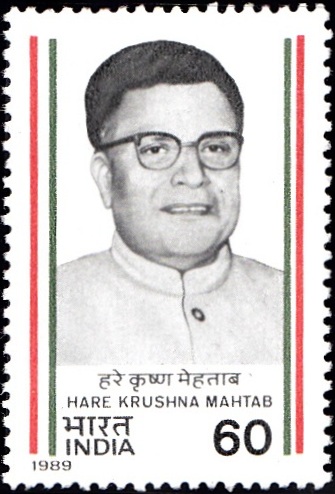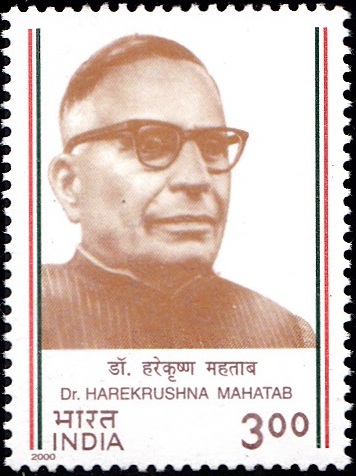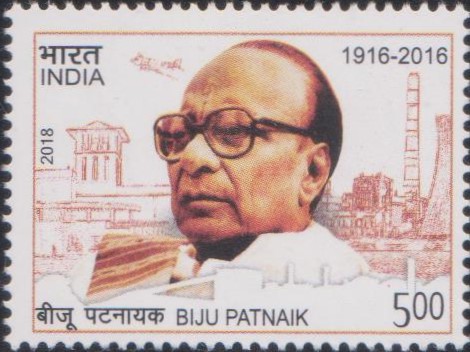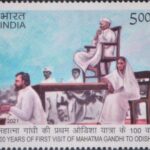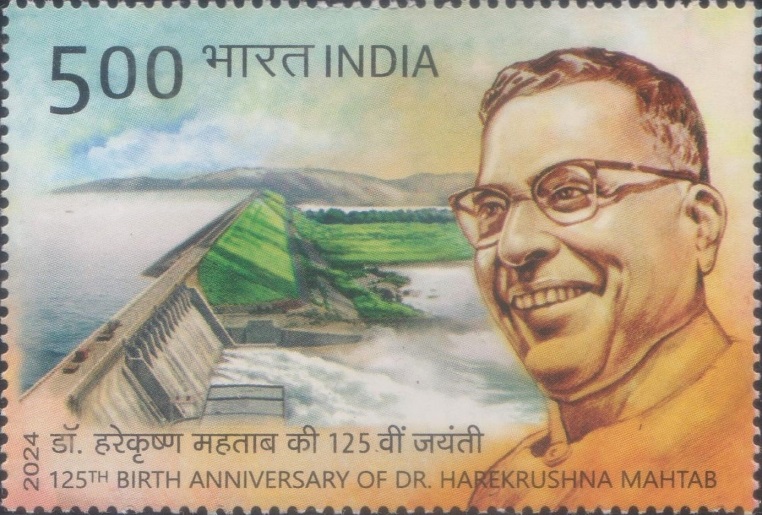
Harekrushna Mahtab 2024
A commemorative postage stamp on 125th Birth Anniversary of ‘Utkal Keshari‘ Dr. Harekrushna Mahatab, 1st Chief Minister of Odisha :
 Issued by India
Issued by India
Issued on Nov 21, 2024
Issued for : Department of Posts is proud to release a Commemorative Postage Stamp on Harekrushna Mahtab on his 125th Birth Anniversary and salutes his unwavering commitment in the welfare of the Nation. His enduring legacy continues to inspire and guide the collective aspirations of the people of Odisha and India.
Credits :
Stamp/FDC/Brochure/Cancellation Cachet : Sh. Sankha Samanta
Type : Stamp, Mint Condition
Colour : Multi Colour
Denomination : 500 Paise
Stamps Printed : 2,02,800
Printing Process : Wet Offset
Printer : Security Printing Press, Hyderabad
Name : Harekrushna Das
Born on 21 Nov, 1899 at Agarpara, Bengal Presidency, British India [now in Odisha]
Died on 2 Jan, 1987 at Bhubaneswar, Odisha, India
About :
- Harekrushna Mahtab, fondly known as “Utkal Keshari,” was a stalwart of Indian politics, leaving an indelible mark on the socio-political landscape of Odisha and India at large. Born on November 21, 1899, in the picturesque village of Agarpara, situated in the Bhadrak district of Odisha, Mahtab belonged to a revered Kshatriya family. His early education commenced at Bhadrak High School, where he imbibed the values of service and sacrifice before pursuing higher studies at Ravenshaw College in Cuttack.
- Mahtab’s political awakening was profoundly influenced by the ideals espoused by Mahatma Gandhi. The fervor of the Indian National Congress (INC) sessions in 1920 prompted him to forsake his academic pursuits and plunge headlong into the freedom struggle in 1921. His journey within the Congress was meteoric, culminating in key leadership roles, including chairmanship of the Balasore District Congress Committee and membership in the Bihar and Odisha Council. Mahtab’s involvement in coordinating the boycott of foreign-made goods during the Non-Cooperation Movement earned him the ire of colonial authorities, leading to his arrest on charges of sedition.
- The year 1930 witnessed Mahtab’s elevation as the president of the Uttar Pradesh Congress Committee, a position from which he drew inspiration from Gandhi’s iconic Dandi March to spearhead a successful salt satyagraha in Orissa, resulting in his imprisonment. Subsequently, in 1932, he assumed the mantle of General Officer Commanding Congress Sevadal, the grassroots arm of the INC, further amplifying his influence within the party ranks.
- Mahtab’s commitment to social justice found expression in his participation in the movement against untouchability in 1934, symbolized by his decision to throw open the doors of his ancestral temple to all. His pivotal role in the Congress Working Committee, nominated by Subhas Chandra Bose in 1938, facilitated his deep engagement with issues of national importance, including the integration of princely states and the Quit India Movement of 1942, during which he endured incarceration in the Ahmednagar Fort Jail until 1945.
- The Constituent Assembly elections of Orissa bore testimony to Mahtab’s leadership prowess, catapulting him into the august assembly where he played a pivotal role in the integration of Odia-speaking princely states into the province, thus shaping the modern contours of Odisha. His tenure as the inaugural Chief Minister of Odisha from 1946 to 1950 and subsequently from 1956 to 1960 marked a transformative phase in the state’s history, characterized by the consolidation of disparate regions and the formulation of policies aimed at fostering socio-economic development.
- Mahtab’s vision for Odisha transcended mere political boundaries, evident in his relentless pursuit of the merger of princely states sharing geographical, linguistic, and ethnological affinities with the state. The establishment of the Eastern States Union posed a formidable challenge, necessitating deft negotiation skills and strategic maneuvering. The eventual accession of states like Nilgiri underscored Mahtab’s pragmatic leadership style, characterized by a judicious blend of firmness and diplomacy.
- Furthermore, Mahtab’s tenure witnessed landmark infrastructural projects, including the relocation of the state capital from Cuttack to Bhubaneshwar, and the establishment of the Hirakud Dam Project and the Rourkela Steel Plant, emblematic of his commitment to industrialization and economic self-sufficiency, resonating with Gandhi’s principles.
- However, Mahtab’s disillusionment with the Congress party’s trajectory under Indira Gandhi’s leadership precipitated his departure, leading to the formation of the Orissa Jana Congress (OJC). Despite encountering limited success, Mahtab remained steadfast in his opposition to authoritarianism during the dark days of the Emergency in 1975, an act of defiance that underscored his unwavering commitment to democratic values.
- Mahtab’s legacy extends beyond the realm of politics. A prolific writer and intellectual luminary, he penned several literary works during his incarcerations, including the novel “Nutan Dharma” and the drama “Swarajya Sadhana.” His historical account, “History of Orissa,” stands as a testament to his scholarly acumen, while his pioneering efforts in journalism, notably through publications like Prajatantra and Rachana, contributed significantly to the dissemination of Gandhian thought and principles.
- Text : Referenced from content provided by the proponent.


